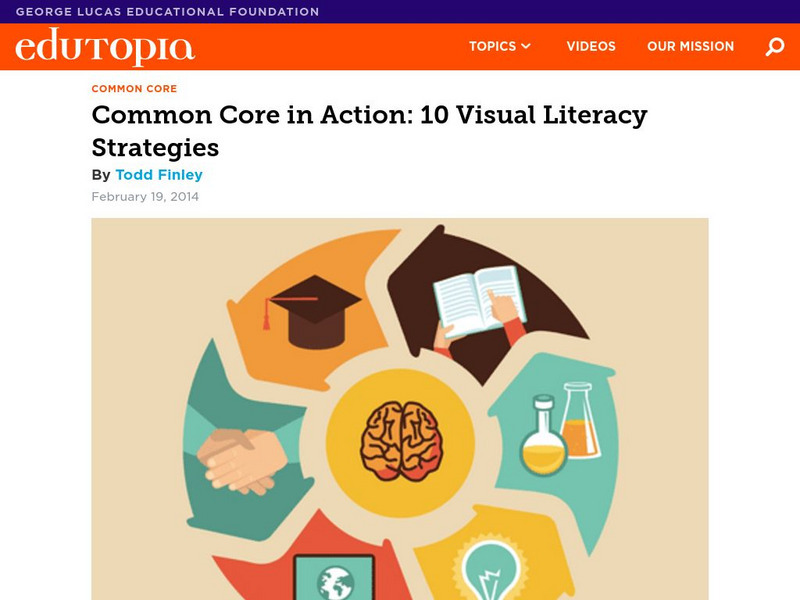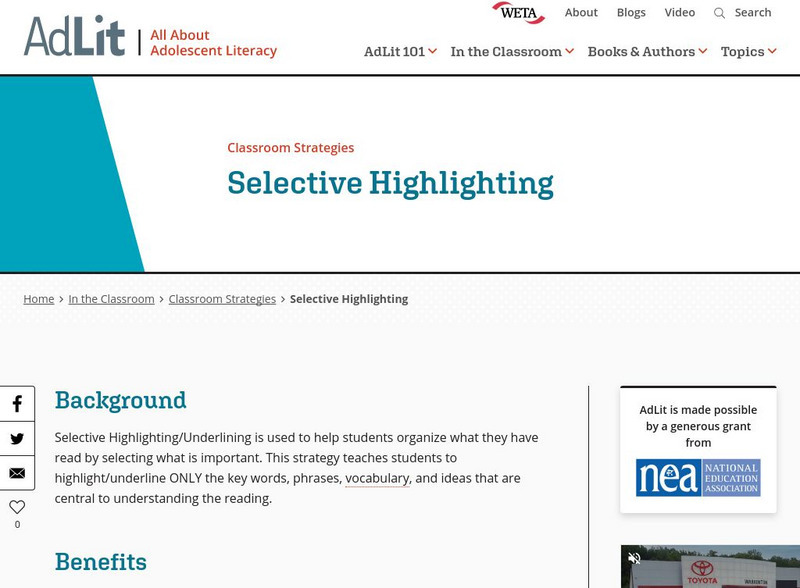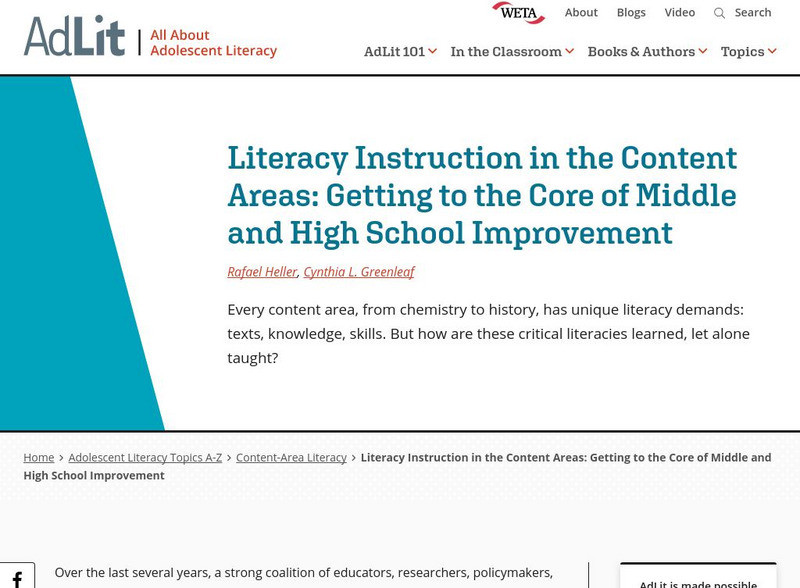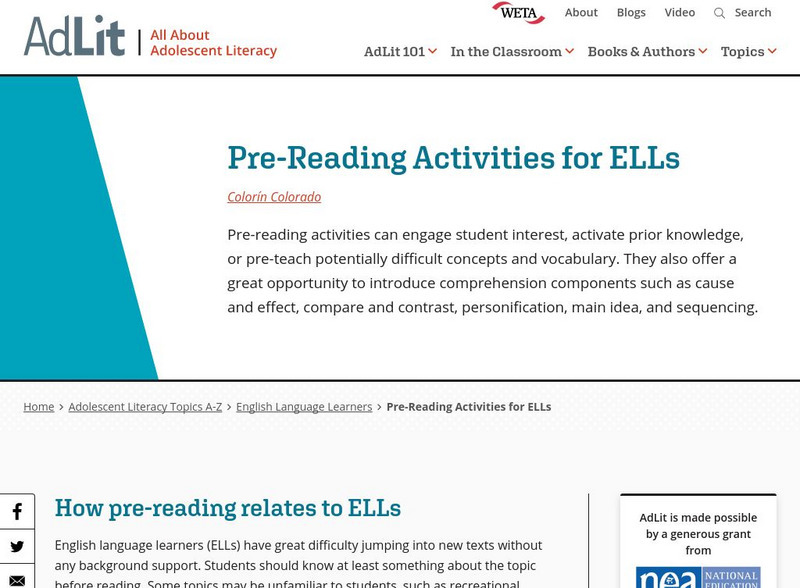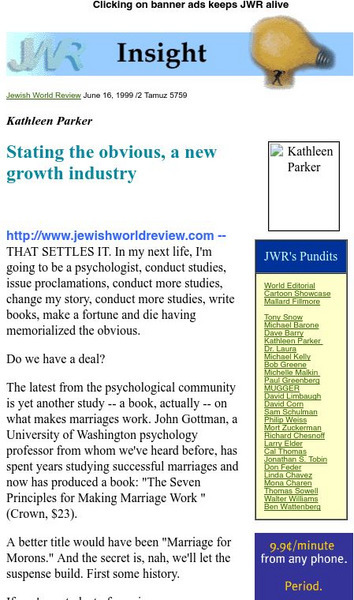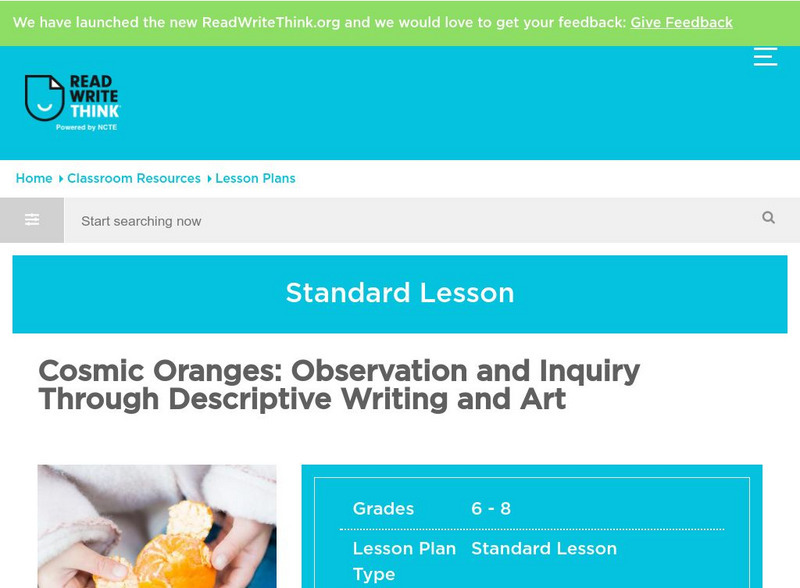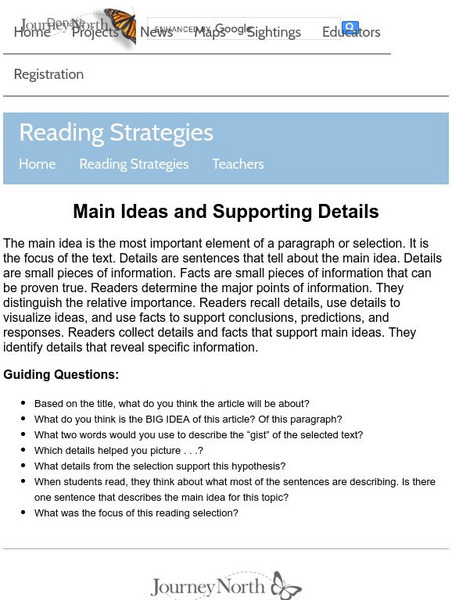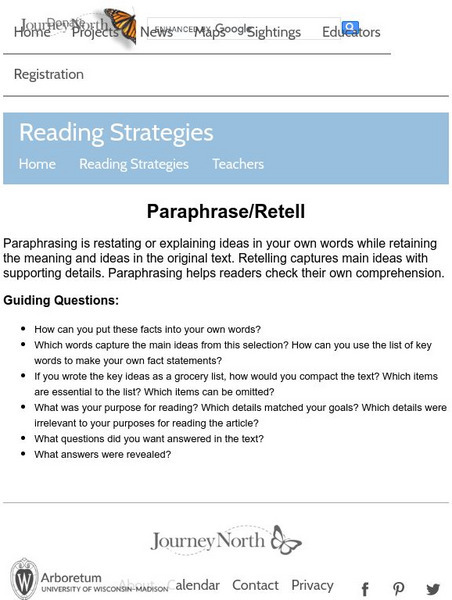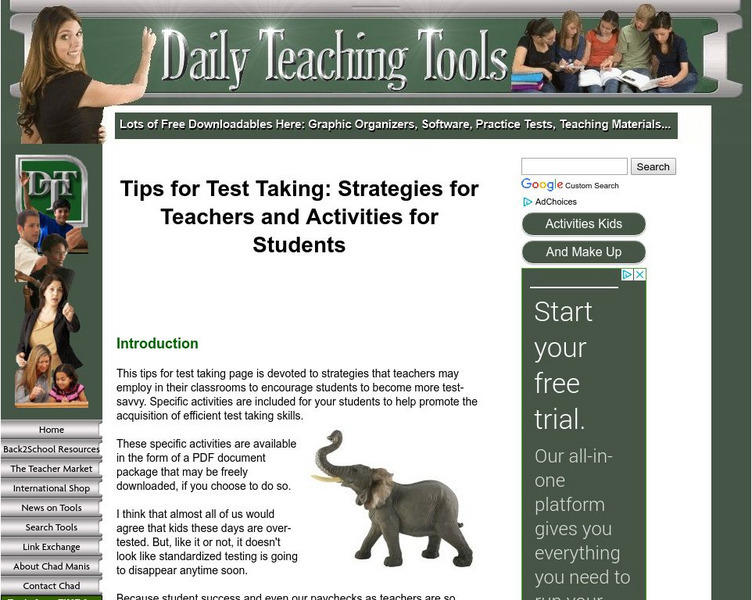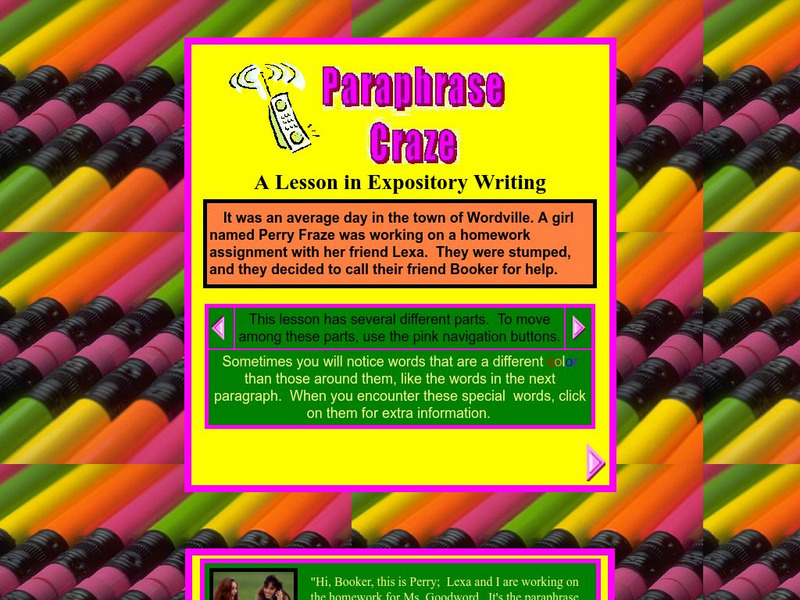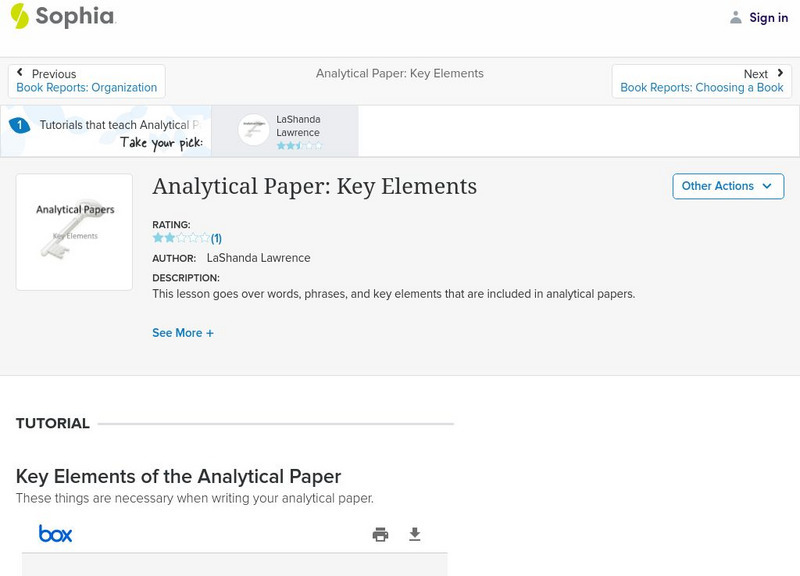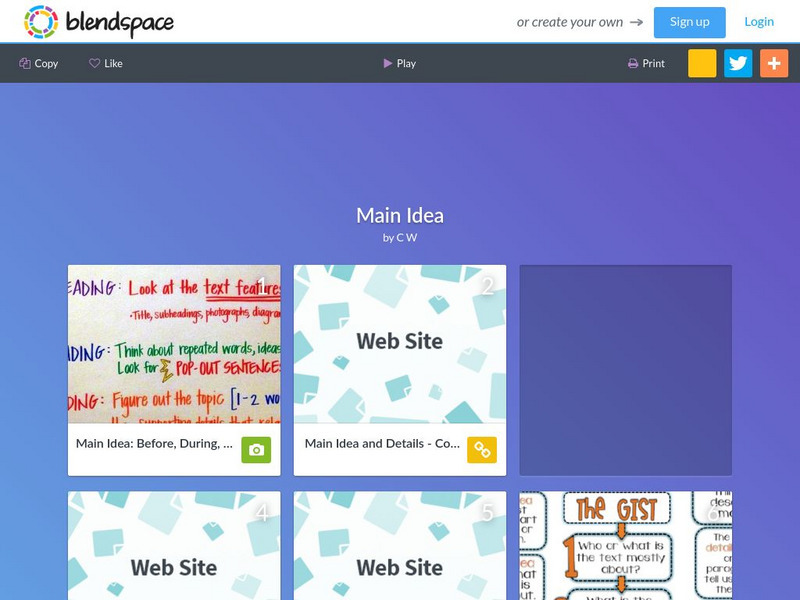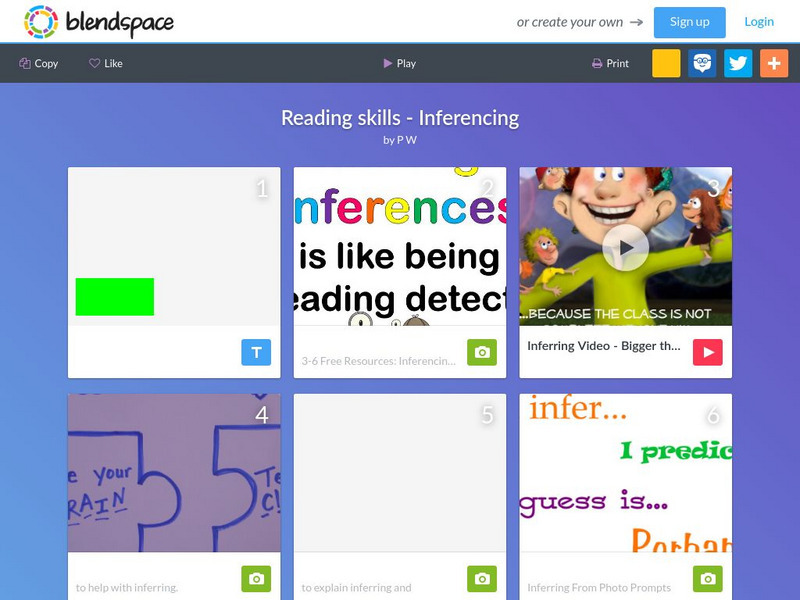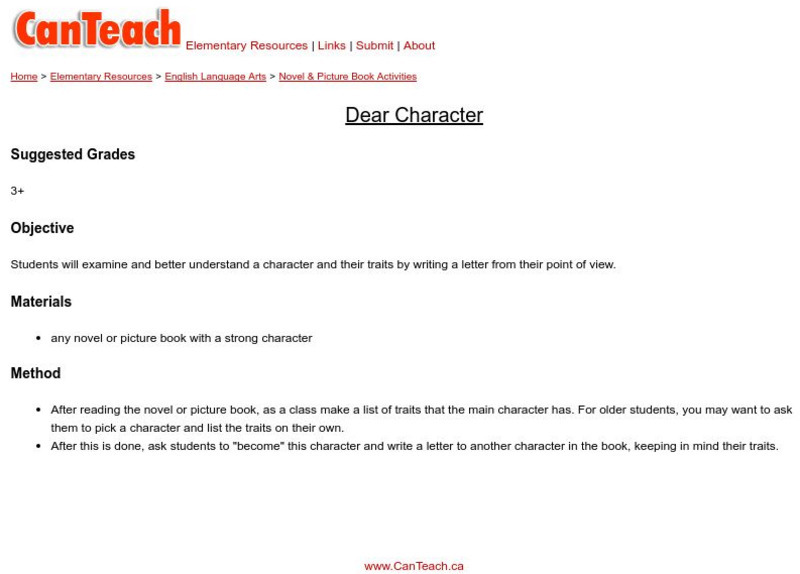Organization for Community Networks
Organization for Community Network: Writing Successful Paragraphs
How can you learn to write a successful paragraph? This site features a lesson plan to help your students sharpen their writing skills.
University of Victoria (Canada)
Study Zone: From Carrots to Renovations: Reading Comprehension
A reading passage with five multiple-choice questions to assess comprehension.
Other
Morningside Center: Active Listening
In this lesson, students practice active listening by paraphrasing what they hear. Students will practice listening to one another and repeating what they heard. Various listening activities are included in this lesson.
Edutopia
Edutopia: Common Core in Action: 10 Visual Literacy Strategies
Explicitly teach a collection of competencies that will help students think through, think about, and think with pictures.
AdLit
Ad lit.org: Classroom Strategies: Selective Highlighting
Selective Highlighting/Underlining is used to help students organize what they have read by selecting what is important. This strategy teaches students to highlight/underline ONLY the key words, phrases, vocabulary, and ideas that are...
AdLit
Ad lit.org: Literacy Instruction in the Content Areas: The Core of Improvement
Every content area, from chemistry to history, has unique literacy demands: texts, knowledge, skills. But how are these critical literacies learned, let alone taught?
AdLit
Ad lit.org: Pre Reading Activities for El Ls
Pre-reading activities can engage student interest, activate prior knowledge, or pre-teach potentially difficult concepts and vocabulary. They also offer a great opportunity to introduce comprehension components such as cause and effect,...
Other
Noodle Tools: Basic Language Literacy: Writing: Paragraph Art
When you create a coherent paragraph, it can be represented by any number of visual images. This page shows examples of how that might work to help writers understand the idea of coherence.
Other
Jewish World Review: Stating the Obvious
Is empathic listening so obvious as to be moronic? Does it work? Here's a dissenting viewpoint of some of the more popular listening, communication, and interpersonal relationship theories.
ReadWriteThink
Read Write Think: Cosmic Oranges
Contains plans for four 45-minute lessons that ask young scholars to use their senses and focus their attention while writing descriptively and observing scientifically. In addition to objectives and standards, this instructional plan...
Annenberg Foundation
Annenberg Learner: Journey North: Reading Strategies: Main Ideas and Supporting Details
Learn how to identify the main ideas and supporting details in an informational text by using a list of guiding questions.
Annenberg Foundation
Annenberg Learner: Journey North: Reading Strategies: Paraphrase / Retell
Learn how to paraphrase a text by using a list of guiding questions.
Daily Teaching Tools
Daily Teaching Tools: Underlining for Comprehension
This Daily Teaching Tools resource provides a test taking strategy. Students will engage in underlining as they preview directions and texts. Students can continue with this strategy as they read.
Other
Strategies for Reading Comprehension:reciprocal Teaching
Use this page to understand the reciprocal teaching strategy that includes the role of the clarifier in student groups.
Beacon Learning Center
Beacon Learning Center: Paraphrase Craze: A Lesson in Expository Writing
This tutorial focuses on how to paraphrase using an excerpt from Poe's short story, "The Tell-Tale Heart." It defines paraphrase and plagiarism, presents examples, and explains what is incorrect about them. It is interactive asking for...
Sophia Learning
Sophia: Analytical Paper: Key Elements: Lesson 2
This lesson goes over words, phrases, and key elements that are included in analytical papers. W.11-12.4 Clear/Coherent Writing
TES Global
Blendspace: Main Idea
A learning module that includes six links to videos, images, and websites that reinforce the reading skill of finding the main idea.
TES Global
Blendspace: Reading Skills Inferencing
A twelve-part learning module with links to texts, images, and videos with information and examples of how to make inferences.
TES Global
Blendspace: Reading Comprehension Visualizing
A five-part learning module with links to images and web sites to help student improve reading comprehension by visualizing.
ClassFlow
Class Flow: Paragraphs 3
[Free Registration/Login Required] This flipchart analyzes how individual paragraphs are structured in writing, examining comments sequenced to follow the shifting thoughts of a character. There are examples listed to justify a point and...
ClassFlow
Class Flow: Writing Review
[Free Registration/Login Required] In this flipchart students will interactively review the following areas of writing: parts of a paragraph; unity, coherence, and elaboration; and the 4 types of writing.
Can Teach
Can Teach: Dear Character
In this lesson plan students will demonstrate reading comprehension and writing skills by writing a letter to a character in a story. Lesson plan indicated for 3rd grade and above, but could be adapted for younger grades.
Can Teach
Can Teach: Different Perspectives a Graphic Organizer
For this lesson plan learners will read a text from a number of different perspectives which will result in a greater understanding of it. This is a good strategy to use to guide students through multiple readings of a text. Lesson plan...
Sophia Learning
Sophia: Emphasis: Repetition
This lesson discusses how to add emphasis through repetition. This tutorial lesson shares a short slideshow with the lesson's content.





